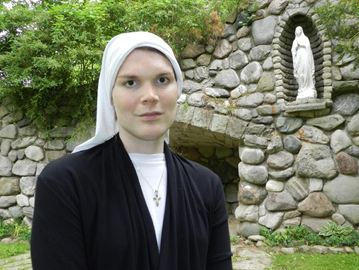Book by transgendered Roman Catholic consecrated maiden explains why God doesn’t hate you
London Community News
By Sean Meyer
As the world’s first transgendered Roman Catholic consecrated maiden, Tia Michelle Pesando has many reasons for wanting to prove Why God Doesn’t Hate You, which is also the name of her new book.
The 35-year-old London resident says the extensive research she did while writing her book shows God’s love for everyone, regardless of sexual orientation or gender identification.
“From a theological perspective, I think I have a solid argument,” Pesando said. “People are leaving the church because they feel the God of love has betrayed them, and betrayal is one of the worst feelings you can imagine. So I am reaching out to people saying this is what the Bible actually says.”
Pesando cemented her life of dedication to God and the church when she became a consecrated maiden, which includes abiding by vows of chastity, poverty and obedience. She also began the process of joining the Carmelite Order of sisters.
Sitting on a bench in the Mount St. -Joseph Grotto, the soft-spoken woman explains she has always felt a strong spiritual presence in her life. What others may see as a sacrifice, she sees as her calling.
Her devout beliefs, along with her own life experience, provided the inspiration for her book. Born a hermaphrodite — meaning she had both male and female reproductive organs — Pesando lived the first 30 years of her life as a man before self-identifying her gender as female.
She views transgendered people as existing on a hermaphrodite spectrum. On one end there is the “true” hermaphrodite who has both sets of working reproductive organs. On the other end are the people Pesando believes suffer the most to live as their self-identified gender, which requires that they take hormones, undergo painful surgery, yet still retain features birth gender features like a lantern jaw or deep voice.
Pesando said she falls somewhere in the middle. “As for me, in terms of transitioning, I didn’t actually have much to do. I haven’t gone under the knife because I don’t really need to,” Pesando said, explaining that neither of her reproductive organs is functional. “I have, so far as I know, always been sort of asexual in the sense of reproduction.
Pesando’s spiritual beliefs started at a young age and when she was a 17, she considered becoming a priest. However, deep down she knew — even if she didn’t understand it for another 13 years — something about that choice just didn’t feel right.
As someone who has faced criticism about both her gender identification and spirituality, Pesando understands people will occasionally lash out when they are faced with something they don’t understand or if it makes them feel uncomfortable.
Not that long ago, in fact, she faced such a response head on while walking to church on Dundas Street in her habit and veil. She smiled as she approached “this scruffy looking man with this scowling expression on his face.” Her friendly gesture was not taken well.
“He snarled at me like a caged tiger and said ‘You are going to Hell. You are no sister,” Pesando recalled. “When you experience a moment like that, you experience something so many in the LGBT community have faced — this wall, this stumbling block that tells you everything is hopeless.”
She was overwhelmed with feelings of defeat in that instance and even considered abandoning her calling. But then she thought of her spiritual experiences and strong belief and the fact she is on a mission to make a difference in people’s lives.
“I just kept walking, kept charging right on. It is funny how that one thing can happen and you can feel like there is nothing but a wall in front of you,” Pesando said. “But then you can get past that obstacle and it can be like a whole new world opens up.”
Given her own experiences, and those of many of the people she has comforted over the years, Pesando felt compelled to write a book that confronts the long-held notion that God couldn’t possibly love homosexuals.
Through her study of the Bible, other theological texts and personal conversations with those within the Roman Catholic Church, Pesando wrote her book to confront the arguments that suggests Christianity advocates hatred over love.
Her purpose in writing Why God Doesn’t Hate You is to reach out to everyone “who feels like they are rejected by God, who feels like they are a second-class citizen in God’s eyes.”
The crux of her book — the arguments she specifically goes about disproving — specifically take on the age-old conception that God hates homosexuals and considers hatred of homosexuals to be justified and that God hates transsexuals, providing humans with one gender that he reveals “by the flesh between our thighs.”
None of that is true, Pesando said, but it is something that is often believed and taken as truth based upon ancient passages, whether dealing with homosexuality or transsexuality.
“There is actually nothing in the Bible to condemn the trans community because they were simply not aware of it,” Pesando said. “Just like there is nothing in the Bible that talks about aerospace engineering, both of these things were discovered about 1,500 years after the it was written.”
Standing with the higher cause, Pesando said, can be very difficult for people because humanity has become so disenchanted. However, one thing she knows without question is what homosexuals feel for each other is love, and that needs to be acknowledged.
“The love between homosexuals is as strong as that between heterosexuals. Thus, if you don’t acknowledge that love, and you are of the religion of love, you seem hypocritical.”


No comments:
Post a Comment